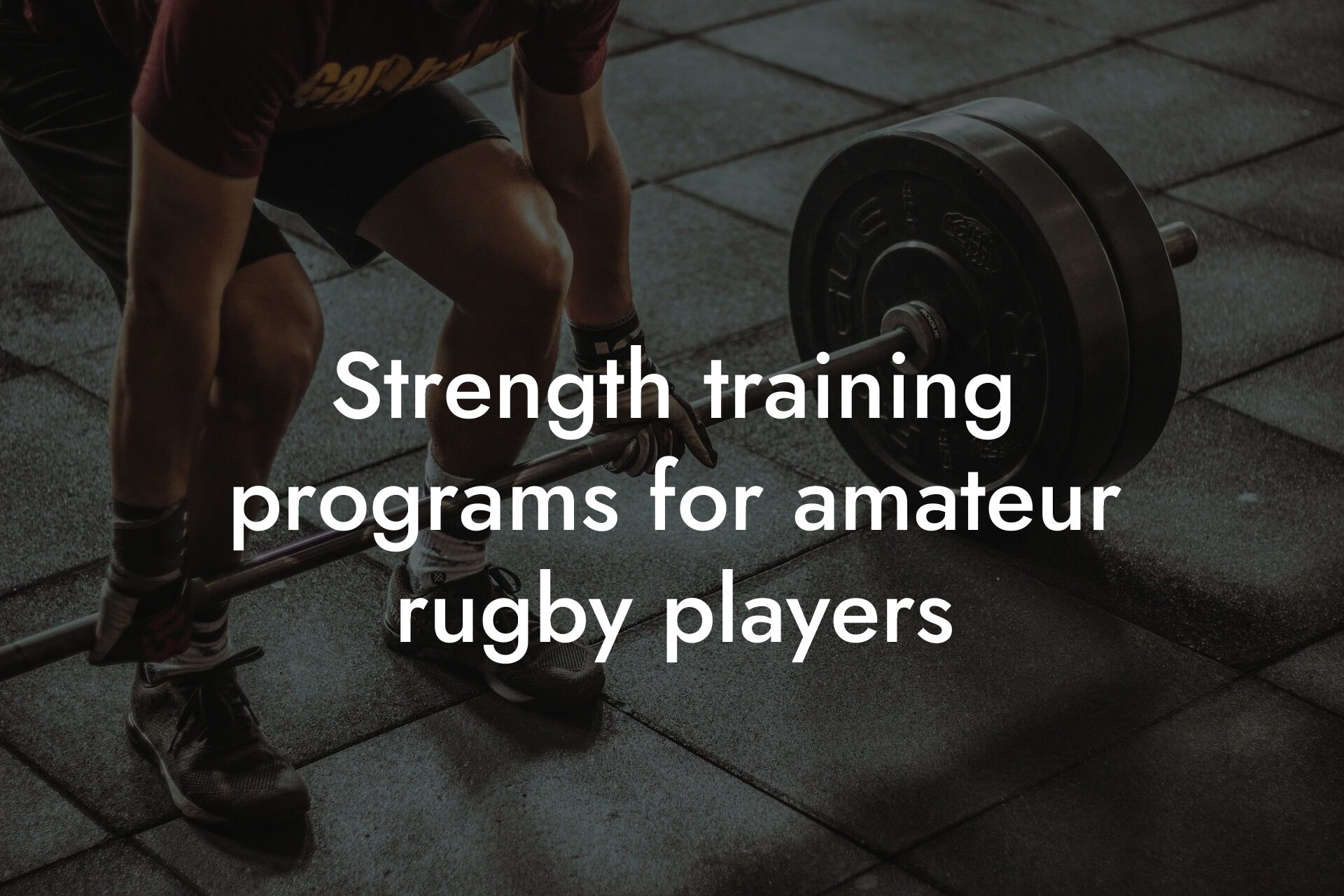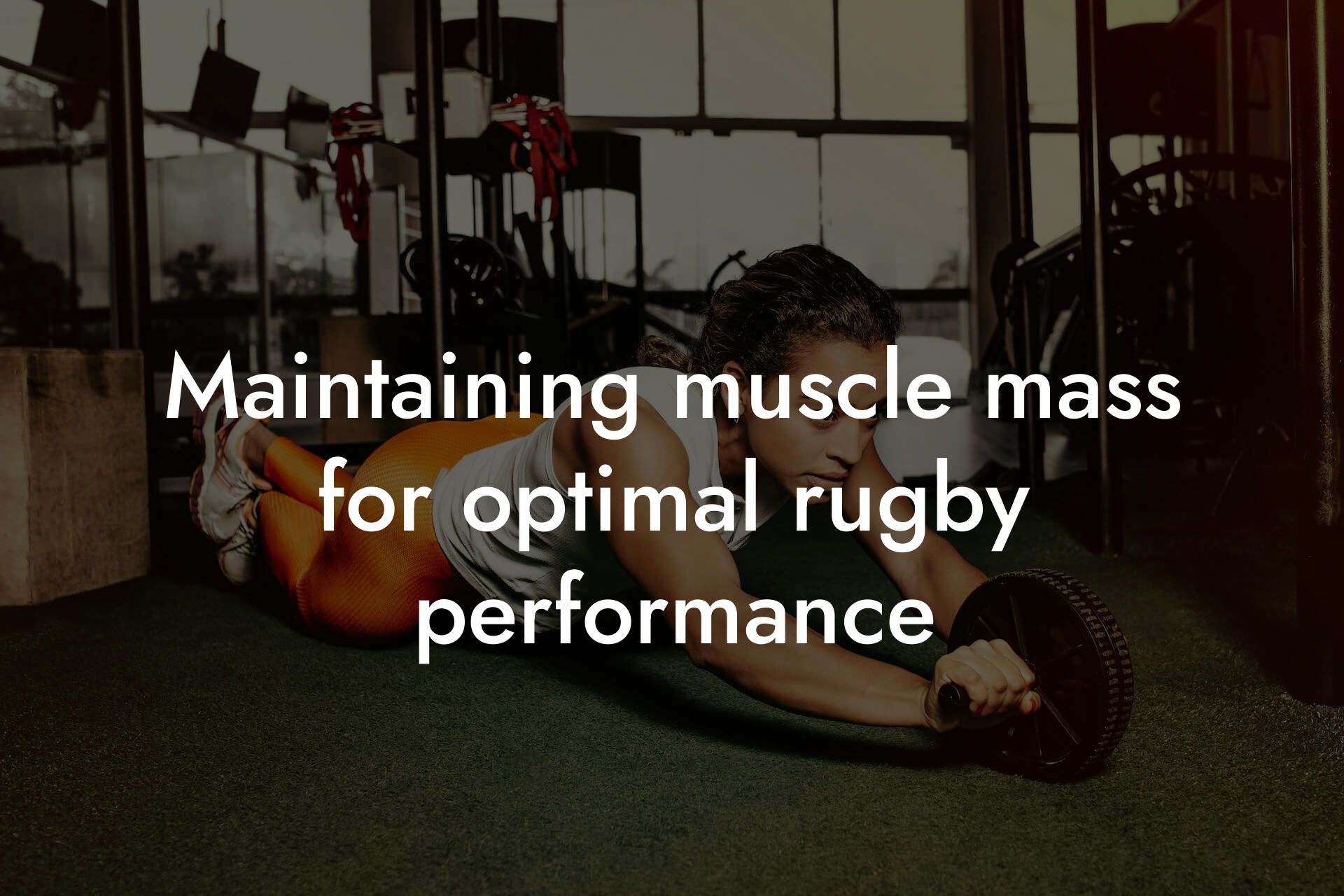Introduction
As an amateur rugby player, the off-season is a critical period to focus on conditioning and improvement. With the rigors of the rugby season taking a toll on your body, it's essential to use this time to recharge, rebuild, and refocus on your fitness goals. In this article, we'll provide a comprehensive guide to off-season conditioning for amateur rugby players, covering the importance of conditioning, setting goals, creating a training plan, and incorporating strength, power, and endurance training.
Table of Contents
- Introduction
- Why Off-Season Conditioning is Crucial for Amateur Rugby Players
- Setting Realistic Goals for the Off-Season
- Creating a Training Plan for the Off-Season
- Strength Training for Rugby Players
- Power Training for Rugby Players
- Endurance Training for Rugby Players
- Active Recovery and Injury Prevention
- Frequently Asked Questions
Why Off-Season Conditioning is Crucial for Amateur Rugby Players
Off-season conditioning is vital for amateur rugby players for several reasons. Firstly, it allows your body to recover from the physical demands of the season, reducing the risk of injury and burnout. Secondly, it provides an opportunity to address any weaknesses or imbalances in your game, improving your overall performance. Finally, a well-structured off-season conditioning program can help you return to the pitch stronger, faster, and more agile, giving you a competitive edge over your opponents.
Setting Realistic Goals for the Off-Season
Before starting your off-season conditioning program, it's essential to set realistic and achievable goals. Take some time to reflect on your performance during the previous season, identifying areas for improvement and setting specific, measurable, and attainable objectives. For example, you may want to increase your speed, improve your endurance, or enhance your strength. Having clear goals will help you stay motivated and focused throughout the off-season.
Creating a Training Plan for the Off-Season
A well-structured training plan is critical to achieving your off-season conditioning goals. A typical plan should include a combination of strength, power, endurance, and active recovery training. Aim to train 3-4 times per week, with at least one day of active recovery or rest in between. Your plan should also include a mix of high-intensity and low-intensity training, allowing your body to adapt and recover.
Strength Training for Rugby Players
Strength training is a critical component of off-season conditioning for rugby players. Focus on exercises that improve your power, speed, and endurance, such as squats, deadlifts, bench press, and rows. Aim to do 3-4 sets of 8-12 reps for each exercise, increasing the weight and intensity as you progress. It's also essential to incorporate exercises that target your core, glutes, and legs, as these are the primary muscles used in rugby.
Power Training for Rugby Players
Power training is designed to improve your explosive strength and speed, essential for rugby players. Incorporate exercises like box jumps, depth jumps, and resisted sprints into your training program. Aim to do 3-5 sets of 3-5 reps for each exercise, focusing on maximum intensity and power. Power training should be done 1-2 times per week, allowing for adequate recovery time.
Endurance Training for Rugby Players
Endurance training is critical for rugby players, as it improves your ability to sustain a high intensity over a prolonged period. Incorporate exercises like jogging, cycling, or rowing into your training program, aiming to do 20-30 minutes of steady-state cardio 2-3 times per week. You can also incorporate high-intensity interval training (HIIT) to improve your anaerobic endurance.
Active Recovery and Injury Prevention
Active recovery and injury prevention are crucial components of off-season conditioning for rugby players. Incorporate low-intensity exercises like yoga, stretching, or foam rolling into your training program, aiming to do 1-2 sessions per week. These exercises will help improve your flexibility, reduce muscle soreness, and prevent injuries. Additionally, make sure to listen to your body, taking regular breaks and resting when needed.
In conclusion, off-season conditioning is a critical period for amateur rugby players to focus on improvement and development. By setting realistic goals, creating a training plan, and incorporating strength, power, and endurance training, you can return to the pitch stronger, faster, and more agile. Remember to prioritize active recovery and injury prevention, and don't be afraid to seek professional guidance or support when needed. With dedication and hard work, you can take your rugby game to the next level.
At Tano Performance Group, we understand the importance of off-season conditioning for amateur rugby players. Our DEXA machine provides a comprehensive body assessment, helping you identify areas for improvement and track your progress throughout the off-season. Contact us today to learn more about how our services can help you achieve your fitness goals.
Frequently Asked Questions
What is off-season conditioning, and why is it important for amateur rugby players?
Off-season conditioning refers to the period of time when amateur rugby players focus on improving their overall fitness, strength, and skills outside of the regular playing season. This is crucial because it allows players to address any weaknesses, work on their overall athleticism, and come back stronger and more prepared for the next season.
How long should my off-season conditioning program last?
The duration of an off-season conditioning program can vary depending on individual goals and needs, but a typical program can last anywhere from 12 to 16 weeks. This allows for a gradual progression from general conditioning to specific rugby-related training.
What are the key components of an off-season conditioning program for amateur rugby players?
A well-rounded off-season conditioning program should include a combination of strength training, power development, speed and agility work, endurance training, and conditioning exercises specific to rugby. It's also essential to incorporate injury prevention and recovery strategies.
How often should I train during the off-season?
Aim to train 3-4 times per week, with at least one or two rest days in between. This allows for adequate recovery time and helps prevent overtraining and burnout.
What are some effective strength training exercises for amateur rugby players?
Focus on exercises that work multiple muscle groups at once, such as squats, deadlifts, bench press, and rows. These exercises will help improve overall strength, power, and athleticism. Additionally, incorporate exercises that target specific rugby-related movements, such as tackling and scrummaging.
How can I improve my power and speed during the off-season?
Incorporate explosive exercises like box jumps, depth jumps, and resisted sprints into your training program. These exercises will help improve your power and speed, allowing you to dominate on the pitch.
What are some effective endurance training methods for amateur rugby players?
Incorporate high-intensity interval training (HIIT) and shuttle runs into your endurance training program. These methods will help improve your anaerobic endurance, allowing you to maintain a high level of intensity over a prolonged period.
How can I prevent injuries during the off-season?
Incorporate injury prevention exercises into your training program, such as exercises that target the shoulder, knee, and ankle joints. Additionally, focus on proper warm-up and cool-down techniques, and prioritize recovery strategies like foam rolling and stretching.
What are some effective recovery strategies for amateur rugby players?
Incorporate recovery strategies like foam rolling, stretching, and self-myofascial release into your daily routine. Additionally, prioritize adequate sleep, nutrition, and hydration to help your body recover from intense training.
How can I track my progress during the off-season?
Use metrics like body fat percentage, lean body mass, and performance indicators like 40-meter sprint times and maximum strength lifts to track your progress. Regularly monitoring your progress will help you stay motivated and adjust your training program as needed.
What are some common mistakes amateur rugby players make during the off-season?
Common mistakes include neglecting strength training, failing to incorporate injury prevention and recovery strategies, and not gradually progressing training intensity and volume. Avoid these mistakes by working with a qualified coach or trainer and prioritizing a well-rounded training program.
How can I stay motivated during the off-season?
Set specific, measurable, and achievable goals for yourself, and find a training partner or accountability group to help stay motivated. Additionally, reward yourself for reaching milestones and celebrate small victories along the way.
What role does nutrition play in off-season conditioning for amateur rugby players?
Nutrition plays a critical role in off-season conditioning, as it helps support muscle growth, recovery, and overall athletic performance. Focus on consuming a balanced diet that includes lean protein sources, complex carbohydrates, and healthy fats.
How can I balance my off-season conditioning program with other aspects of my life?
Prioritize your training program and schedule it into your daily routine. Additionally, learn to say "no" to non-essential commitments and focus on time-management strategies to help balance your training program with work, family, and social obligations.
What are some effective conditioning exercises for amateur rugby players?
Incorporate exercises like pro agility shuttles, cone drills, and hill sprints into your conditioning program. These exercises will help improve your speed, agility, and endurance, allowing you to dominate on the pitch.
How can I incorporate rugby-specific skills into my off-season conditioning program?
Incorporate skills like passing, tackling, and ball handling into your training program. This will help improve your overall rugby skills and prepare you for the demands of the game.
What are some effective ways to improve my bone density as an amateur rugby player?
Incorporate resistance training exercises that target multiple muscle groups at once, such as squats and deadlifts. Additionally, prioritize adequate calcium and vitamin D intake through your diet and supplements.
How can I reduce my body fat percentage during the off-season?
Focus on creating a calorie deficit through a combination of diet and exercise. Additionally, prioritize strength training exercises that target multiple muscle groups at once, as these exercises will help improve your overall metabolism and burn fat more efficiently.
What are some effective ways to improve my physique as an amateur rugby player?
Focus on building lean muscle mass through strength training exercises, and prioritize a balanced diet that includes lean protein sources, complex carbohydrates, and healthy fats. Additionally, incorporate conditioning exercises that target specific areas of the body, such as the core and legs.
How can I stay accountable and motivated during the off-season?
Work with a qualified coach or trainer, and join a training group or accountability program. Additionally, set specific, measurable, and achievable goals for yourself, and track your progress regularly.
What are some common misconceptions about off-season conditioning for amateur rugby players?
Common misconceptions include thinking that off-season conditioning is only for professional players, or that it's only about getting bigger and stronger. Avoid these misconceptions by prioritizing a well-rounded training program that addresses all aspects of rugby performance.
How can I get started with an off-season conditioning program as an amateur rugby player?
Consult with a qualified coach or trainer, and set specific, measurable, and achievable goals for yourself. Additionally, start with a gradual progression of training intensity and volume, and prioritize injury prevention and recovery strategies.
What are some effective resources for amateur rugby players looking to improve their off-season conditioning?
Consult with a qualified coach or trainer, and utilize online resources like training programs, videos, and articles. Additionally, join a training group or accountability program to stay motivated and accountable.
Here are some related articles you might love...
- Strength training programs for amateur rugby players
- Using DEXA scans to optimize rugby training
- Maintaining muscle mass for optimal rugby performance
- Nutrition strategies for sustaining energy during rugby matches
- How to optimize endurance and power in rugby
- The role of body composition in rugby performance
- Recovery strategies for rugby athletes after matches
- Reducing body fat for better agility and power in rugby
- Bone density and injury prevention in rugby
Zak Faulkner
Zak Faulkner is a leading authority in the realm of physical health and body composition analysis, with over 15 years of experience helping professionals optimise their fitness and well-being. As one the experts behind Tano Performance Group, Zak has dedicated his career to providing in-depth, science-backed insights that empower clients to elevate their physical performance and overall health.
With extensive knowledge of DEXA technology, Zak specializes in delivering comprehensive body assessments that offer precise data on body fat, muscle mass, bone density, and overall physique. His expertise enables individuals to make informed decisions and achieve their fitness goals with accuracy and confidence. Zak’s approach is rooted in a deep understanding of human physiology, combined with a passion for helping clients unlock their full potential through personalised strategies.
Over the years, Zak has earned a reputation for his commitment to excellence, precision, and client-focused service. His guidance is trusted by top professionals who demand the best when it comes to their health. Whether advising on fitness programs, nutritional strategies, or long-term wellness plans, Zak Faulkner’s insights are a valuable resource for anyone serious about taking their health and fitness to the next level.
At Tano Performance Group, Zak continues to lead our Content Team revolutionising how professionals approach their physical health, offering unparalleled expertise that drives real results.




